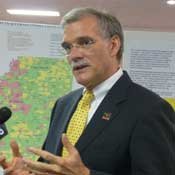U.S. Census Bureau Director Robert Groves met yesterday with representatives from a variety of Mississippi civil rights advocacy organizations to address concerns about low census participation in parts of the state. Groves' visit came in response to a May 18 letter to the Congressional subcommittee overseeing the census that highlighted obstacles to administering the census in historically hard-to-count communities.
The letter signed by 30 civil rights groups and the Leadership Conference on Civil and Human Rights, warned that households in some Delta communities never received Census forms in the mail. It also raised concerns that Census workers in areas with large African American or immigrant populations did not have the necessary language skills or cultural sensitivities to earn residents' trust.
In Tunica County, community activists who canvassed neighborhoods after Census forms went out in March found many households who never received the Census questionnaire.
"We did a lot of things to get the community hyped up through our school system, every means of media we could use, but people just did not get the questionnaire," Marilyn Young, founder of Citizens for a Better Tunica County said. "We don't know where the ball was dropped, but it was definitely dropped."
Census Bureau statistics from April 27 show that only 49 percent of households in Tunica County who did receive questionnaires actually returned them.
"The Mississippi Delta, we believe, has been neglected," Young said. "We do not have a Census office in the Mississippi Delta, and that's where we believe all of the hard-to-count counties are. We feel that is very unfair to the 2nd Congressional district."
Groves said that the number of the staff and placement of Census offices had less bearing on participation rates than the type of people hired for Census jobs.
"It is not a matter of not enough staff," Groves said. "The problem is making sure that the people we do hire are effective at getting cooperation from folks. ... I don't think the placement of offices is a critical thing. The personnel that are on the ground, knocking on doors--that's the key."
Groves heard concerns from a number of Mississippi-based groups, including the Mississippi Immigrant Rights Alliance, Southern Echo, the Mississippi NAACP and Boat People SOS. The director said that he received valuable information on specific households and addresses that the Census Bureau may have missed in its initial mailing. Groves also acknowledged the importance of hiring trusted workers for canvassing.
"Despite the fact that we try to hire locally, sometimes we can't hire as locally as we need to hire," Groves said. "We have the ability to seek assistance from local neighborhoods. We'll probably move on that pretty quickly."
Since May, Census workers have been knocking on doors at every address that did not return a questionnaire. The canvassing phase will wrap up in July.
In December, the Census Bureau will present data on statewide population totals to the President for use in reapportioning seats in the U.S. House of Representatives. Population loss led to Mississippi losing a house seat after the 2000 Census, and advocacy groups are concerned that an incomplete count could further erode the state's federal representation.
Census data also determines how the federal government distributes roughly $400 billion in annual aid to states and will affect redistricting for the Mississippi Legislature.
Previous Comments
- ID
- 158047
- Comment
I don't think the people of Mississippi understands the importance of the Census. The media needs to get out in front of this (thanks JFP) and make sure information gets out to the public that when a census workers comes knocking, they need to answer the call. It makes the total community better when we have adequate representation in Washington.
- Author
- chambliss65
- Date
- 2010-06-04T13:45:17-06:00



Comments
Use the comment form below to begin a discussion about this content.
comments powered by Disqus